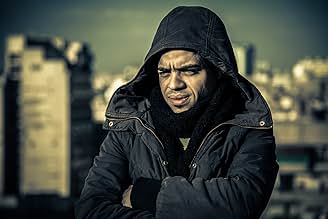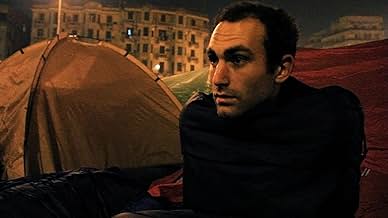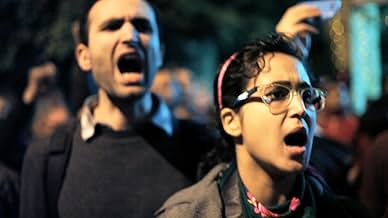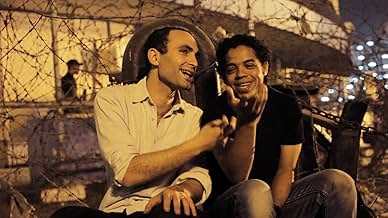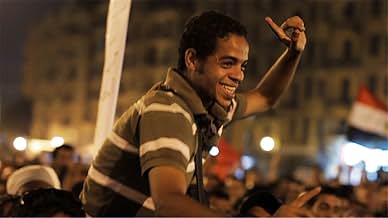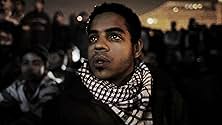Ajouter une intrigue dans votre langueA group of Egyptian revolutionaries battle leaders and regimes, risking their lives to build a new society of conscience.A group of Egyptian revolutionaries battle leaders and regimes, risking their lives to build a new society of conscience.A group of Egyptian revolutionaries battle leaders and regimes, risking their lives to build a new society of conscience.
- Nommé pour 1 Oscar
- 16 victoires et 16 nominations au total
- Self - Revolutionary
- (as Aida El Kashef)
Avis à la une
We meet 5 courageous characters, a variety of Egyptians, and we learn why they devoted the last two years of their lives to protesting in the square. The way they speak about their country is heartbreakingly direct, and when they suffer for their goals it's heartbreaking. Interesting, too, is the balance of art, protest, technology, discussion, and music in the protester's toolkits. The picture is up-close, traumatic, and fast-paced, which was all the better. When a story is ongoing, I don't want a portrait with clear summaries and 20/20 hindsight. I want the information that the revolutionaries had as they made their decisions.
The Square focuses on a perspective that didn't have it's voice in the mainstream media, the liberal perspective. A point of view that basically initiated the Egyptian revolution. It's ambition doesn't necessarily focus on appointing a new leader nor a new constitution. But on how an Egyptian were dismissing the needs of another Egyptian for their own political interests. Although Director Jehane Noujaim showed the various different perspectives on the revolution, she succeeded on finding the ultimate common interest that led to the downfall of The Mubarak Regime, The Supreme Court of Armed Forces and last but not least, The Muslim Brotherhood.
The style of filmmaking and editing also contribute heavily on the film. The way the story transitions through music and art was spectacular. This proves what an individual can do with a camera.
The awards that went to this movie doesn't even give it justice. But the movie itself gives justice to the people of Egypt and to those who lost their souls fighting for it.
It should first be noted that this revolution began as more of a protest. Citizens just fed up with the Mubarek regime began congregating in Tahrir Square in hopes of influencing change and a transition to a society of conscience. Ms. Noujaim and her multitude of cameras follows a hand full of these protesters and the changes that occur inside the revolution. These changes occur as Mubarek falls, the military takes over and betrays the movement, and then the Muslim Brotherhood takes control when Mohamed Morsi wins the election. This causes the loss of solidarity in the movement as it becomes clear that the Brotherhood consorted with the military to gain power, proving their mission was quite different.
One of the faces of the revolution is Egyptian actor Khalid Abdalla who you might recognize from the fine 2007 film The Kite Runner. Abdalla speaks excellent English and is clearly passionate about the vision. His comments also drive home the difference in a protest and the politics of a true revolution. We only get a couple of on camera comments from government and military officials, but the real insight and spirit of the film is captured in the faces, words and actions of those involved in the sit-ins, despite the many violent attempts to shut them down.
The most staggering visual comes from an aerial view of Cairo as the camera captures the masses as they descend on the streets during the third uprising that we see. It's breathtaking and in stark contrast to the news reports we saw in the U.S. Unfortunately, there is still no resolution in this as Egypt is still in flux and preparing for yet another election. That brings even more power to the "in the moment" point of view that this film delivers. http://moviereviewsfromthedark.com/
On and off between late 2010 and 2013, thousands of protesters against "injustice, corruption, poverty, ignorance" filled Tahrir Square in Cairo,
But it was not over when Mubarak was ousted as the military took control. The people once again marched to the square demanding civilian rule.
We see incredible footage of the people's occupation of Tahrir Square, the violent attacks on the protesters, and heated political arguments in the street as secular Muslims express their embarrassment at the religious-based oppression by the newly powerful Brotherhood.
This is a sharp warning to the powerful not to mess with the people that will resonate with anyone anywhere.
"The Square" is a film about the Egyptian Revolution--something that is not yet complete and is in its third year. The film traces the steps that have occurred from the standpoint of folks who have staged sit-ins at Tahrir Square. The Revolution occurred because, quite simply, folks were sick and tired of the repression, torture and violence done by the Mubarak military-backed regime. At first, all groups opposed to the government banded together--they all wanted change. However, through the course of the Revolution, those opposing the government soon fell into two camps--the Muslim Brotherhood (which wanted a government based on Sharia law; i.e., a strict theocracy) and the rest who were pushing for democratic freedoms. And, sadly, as the process continued, the Brotherhood soon allied itself with the military. It seemed that individual freedom was NOT what the organization was about after all--they just wanted power for themselves and not the other dissidents. What's to happen? After all, the leader of the Brotherhood has just been elected president and the legislature is controlled by them as well. Well, oddly, the democratic groups had one final ally--the military!! Weird, as now the military is back in control--and with the consent, for now, of the democracy movement! Obviously, the Revolution is far from over.
The film is a must-see for everyone, as the news media here in the US has done a terrible job covering the events. And, too often, they just parrot the administration's assertion that the Brotherhood is a representative government. It's also a must-see because it shows various sides of the conflict and is highly informative. Additionally, you really have to admire the filmmakers--they could have easily been killed filming some of the scenes. Exceptional.
Le saviez-vous
- AnecdotesThe film is both the first Kickstarter (crowd-sourced) film to be nominated for an Oscar, but it is also the first film released by Netflix to receive a nomination.
- Citations
Ahmed Hassan - Revolutionary: We're not looking for a leader as much as we're looking for a conscience. What is a leader anyway? Are they going to offer solutions from the heavens? They won't do that. The thing is, if we are able to create this conscience within the society, we'll be able to find a good president. We are not looking for a leader to rule us.
- ConnexionsFeatured in The 2014 Film Independent Spirit Awards (2014)
Meilleurs choix
- How long is The Square?Alimenté par Alexa
Détails
- Date de sortie
- Pays d’origine
- Sites officiels
- Langues
- Aussi connu sous le nom de
- The Square
- Lieux de tournage
- Tahrir Square, Le Caire, Égypte(the main location)
- Sociétés de production
- Voir plus de crédits d'entreprise sur IMDbPro
Box-office
- Budget
- 1 500 000 $US (estimé)
- Montant brut aux États-Unis et au Canada
- 124 244 $US
- Week-end de sortie aux États-Unis et au Canada
- 16 359 $US
- 27 oct. 2013
- Montant brut mondial
- 124 244 $US
- Durée1 heure 48 minutes
- Couleur







